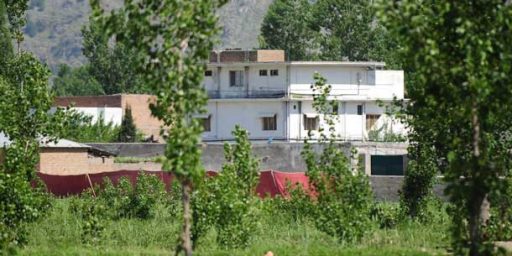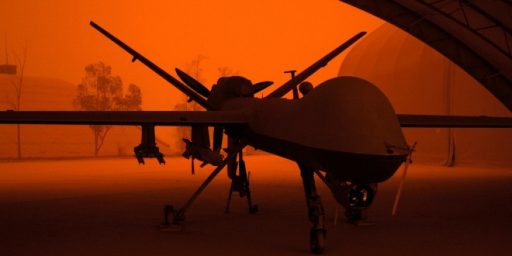Lack Of Drone Strikes Helps Pakistani Militants
This shouldn’t be at all surprising:
WASHINGTON — A nearly two-month lull in American drone strikes in Pakistan has helped embolden Al Qaeda and several Pakistani militant factions to regroup, increase attacks against Pakistani security forces and threaten intensified strikes against allied forces in Afghanistan, American and Pakistani officials say.
The insurgents are increasingly taking advantage of tensions raised by an American airstrike in November that killed two dozen Pakistani soldiers in two border outposts, plunging relations between the countries to new depths. The Central Intelligence Agency, hoping to avoid making matters worse while Pakistan completes a wide-ranging review of its security relationship with the United States, has not conducted a drone strike since mid-November.
Diplomats and intelligence analysts say the pause in C.I.A. missile strikes — the longest in Pakistan in more than three years — is offering for now greater freedom of movement to an insurgency that had been splintered by in-fighting and battered by American drone attacks in recent months. Several feuding factions said last week that they were patching up their differences, at least temporarily, to improve their image after a series of kidnappings and, by some accounts, to focus on fighting Americans in Afghanistan.
Other militant groups continue attacking Pakistani forces. Just last week, Taliban insurgents killed 15 security soldiers who had been kidnapped in retaliation for the death of a militant commander.
The spike in violence in the tribal areas — up nearly 10 percent in 2011 from the previous year, according to a new independent report — comes amid reports of negotiations between Pakistan’s government and some local Taliban factions, although the military denies that such talks are taking place.
A logistics operative with the Haqqani terrorist group, which uses sanctuaries in Pakistan to carry out attacks on allied troops in Afghanistan, said militants could still hear drones flying surveillance missions, day and night. “There are still drones, but there is no fear anymore,” he said in a telephone interview. The logistics operative said fighters now felt safer to roam more freely.
Over all, drone strikes in Pakistan dropped to 64 last year, compared with 117 strikes in 2010, according to The Long War Journal, a Web site that monitors the attacks. Analysts attribute the decrease to a dwindling number of senior Qaeda leaders and a pause in strikes last year after the arrest in January of Raymond Davis, a C.I.A. security contractor who killed two Pakistanis; the Navy Seal raid in May that killed Osama bin Laden; and the American airstrike on Nov. 26.
Pakistan ordered drone operations at its Shamsi air base closed after that airstrike, but C.I.A. drones flying from bases in Afghanistan continue to fly surveillance missions over the tribal areas. The drones would be cleared to fire on a senior militant leader if there was credible intelligence and minimal risk to civilians, American officials said. But for now, the Predator and Reaper drones are holding their fire, the longest pause in Pakistan since July 2008.
And the longer they do, the more the militants will be able to further entrench themselves.






If we started randomly blowing up apartment buildings where suspected gang members lived in sufficiently voulme, it would probably start disruptting the activities of the gangs to.
I doubt the hundreds or thousands of collateral dead would consider that a good tradeoff.
The story is pure propaganda from the administration, once again from anonymous sources with zero credibility and no evidence presented that what they say is true. When the basis for a story is “american officials say”, it’s best to throw it out the window and pretend you never read it.
Because drone strikes have made our campaign against the Taliban in Afghanistan so successful?
@Stormy Dragon: Random drone strikes…there’s a new one.
@Herb:
From the perspective of the civilians who die in them, often based on what turns out to be faulty intelligence, they are for all intents and purposes random.
@Stormy Dragon: Oh, I see….the military is using faulty intelligence to “randomly” kill innocent people. That makes total sense.
@Herb:
FIFY. Does the comment make better sense, now?
@A voice from another precinct: Thanks…I’m not really impressed with being against “faulty intelligence.” I’m against faulty intelligence too. Faulty intelligence, almost by definition, never comes with a good result.
If the argument is that we shouldn’t use faulty intelligence to kill innocent people, I agree. But that’s not the argument, is it? Not really.